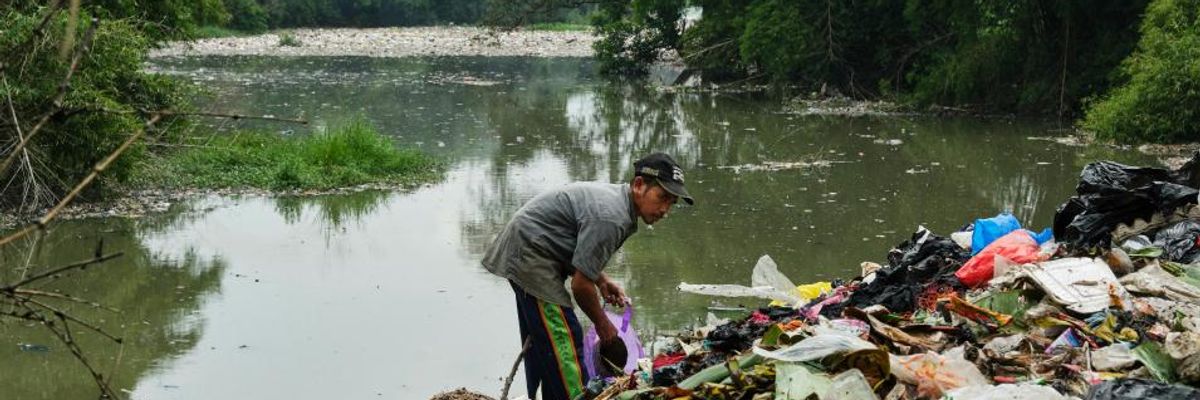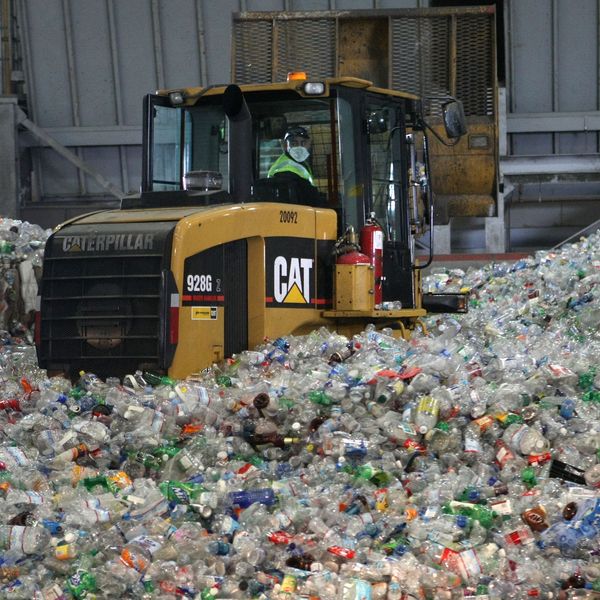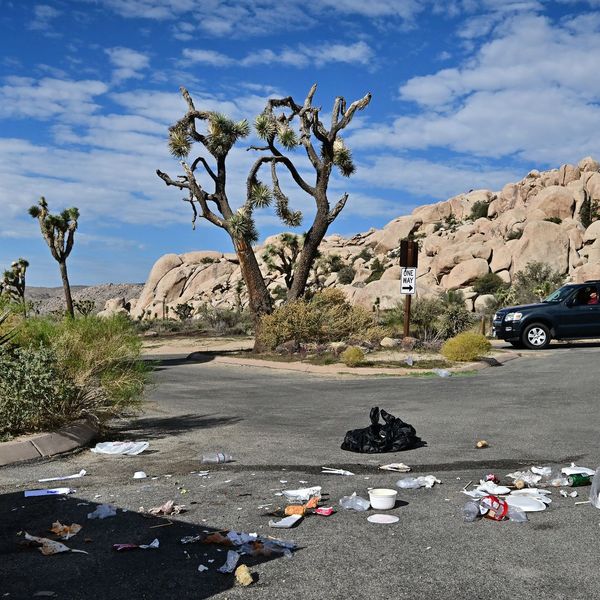
A man collects plastic waste left by high water along the banks of a tributary of the Citarum River--considered one of the world's most polluted waterways--on Jan. 14, 2019 outside Bandung, Java, Indonesia. (Photo: Ed Wray/Getty Images)
187 Countries Just Took 'Crucial' Step to Stop Rich Nations From Treating Global South as Dumping Ground for Plastic Waste
"Today's decision demonstrates that countries are finally catching up with the urgency and magnitude of the plastic pollution issue."
In what campaigners are calling "a major first step to stem the tide of plastic waste now flowing from the rich developed countries to developing countries in Africa and Asia," 187 countries reached a deal Friday to add restrictions on plastics to a key United Nations treaty.
"Ultimately, production of plastics has to be significantly curtailed to effectively resolve the plastic pollution crisis."
--Von Hernandez, Break Free from Plastic
The Basel Convention, adopted in 1989, is designed to protect human health and the environment by regulating the transportation of hazardous waste across borders. The latest meeting of parties to the convention concluded in Geneva on Friday with news of the finalized agreement.
The new rules (pdf) were met with praise from public health and environmental advocates, who celebrated the unanimously adopted amendment as "an important tool for countries in the Global South to stop the dumping of unwanted plastic waste into their country."
"It's only fair that countries should have the right to refuse plastic pollution shipped to their border," Sirine Rached of the Global Alliance for Incinerator Alternatives (GAIA) said in a statement.
\u201c\ud83d\udea8BREAKING\ud83d\udea8: UN decides to control global plastic waste dumping. \n\ud83c\udf0f\nA HUGE moment in the fight against #plasticpollution.\n\nhttps://t.co/jH1t42Vv1a\n\n#breakfreefromplastic #cleanplanethealthypeople\u201d— breakfreefromplastic (@breakfreefromplastic) 1557505423
"For far too long, developed countries like the U.S. and Canada have been exporting their mixed toxic plastic wastes to developing Asian countries claiming it would be recycled in the receiving country," explained Dr. Sara Brosche of IPEN, a global network of public interest groups. "Much of this contaminated mixed waste cannot be recycled and is instead dumped or burned, or finds its way into the ocean."
Parties to the Basel Convention hope to curb the mounting plastic pollution crisis with the amendment--which, as IPEN outlined in a statement, focuses on:
- Removing or reducing the use of hazardous chemicals in plastics production and at any subsequent stage of their life cycle.
- Setting of specific collection targets and obligations for plastics producers to cover the costs of waste management and clean-up.
- Preventing and minimizing the generation of plastic waste, including through increasing the durability, reusability, and recyclability of plastic products.
- Significant reduction of single-use plastic products.
Although IPEN expressed disappointment that a group of cured resins and fluorinated polymers--some of which release toxic chemicals as they break down--was left out of the requirement of prior informed consent, the Sweden-based organization noted that delegates in Geneva agreed to review the issue when they meet again in two years.
In addition to detailing how the convention could be further amended, advocates of reducing plastic waste also emphasized the need for broader and bolder actions to address the worldwide pollution crisis.
"Pollution from plastic waste, acknowledged as a major environmental problem of global concern, has reached epidemic proportions."
--Rolph Payet, UNEP
Rolph Payet, executive secretary at U.N. Environment (UNEP) for the Basel, Rotterdam, and Stockholm Conventions, said Friday that "pollution from plastic waste, acknowledged as a major environmental problem of global concern, has reached epidemic proportions with an estimated 100 million tonnes of plastic now found in the oceans, 80-90 percent of which comes from land-based sources."
The amendment to the Basel Convention is "crucial" to "compelling source countries to ensure exports of clean, recyclable plastics only," said Von Hernandez, global coordinator of the Break Free from Plastic movement.
"Recycling will not be enough, however," he added. "Ultimately, production of plastics has to be significantly curtailed to effectively resolve the plastic pollution crisis."
David Azoulay of the Center for International Environmental Law acknowledged Friday that "plastic pollution in general and plastic waste in particular remain a major threat to people and the planet"--but he also expressed enthusiasm about the potential for ambitious next steps.
"Today's decision," Azoulay said, "demonstrates that countries are finally catching up with the urgency and magnitude of the plastic pollution issue and shows what ambitious international leadership looks like."
An Urgent Message From Our Co-Founder
Dear Common Dreams reader, The U.S. is on a fast track to authoritarianism like nothing I've ever seen. Meanwhile, corporate news outlets are utterly capitulating to Trump, twisting their coverage to avoid drawing his ire while lining up to stuff cash in his pockets. That's why I believe that Common Dreams is doing the best and most consequential reporting that we've ever done. Our small but mighty team is a progressive reporting powerhouse, covering the news every day that the corporate media never will. Our mission has always been simple: To inform. To inspire. And to ignite change for the common good. Now here's the key piece that I want all our readers to understand: None of this would be possible without your financial support. That's not just some fundraising cliche. It's the absolute and literal truth. We don't accept corporate advertising and never will. We don't have a paywall because we don't think people should be blocked from critical news based on their ability to pay. Everything we do is funded by the donations of readers like you. Will you donate now to help power the nonprofit, independent reporting of Common Dreams? Thank you for being a vital member of our community. Together, we can keep independent journalism alive when it’s needed most. - Craig Brown, Co-founder |
In what campaigners are calling "a major first step to stem the tide of plastic waste now flowing from the rich developed countries to developing countries in Africa and Asia," 187 countries reached a deal Friday to add restrictions on plastics to a key United Nations treaty.
"Ultimately, production of plastics has to be significantly curtailed to effectively resolve the plastic pollution crisis."
--Von Hernandez, Break Free from Plastic
The Basel Convention, adopted in 1989, is designed to protect human health and the environment by regulating the transportation of hazardous waste across borders. The latest meeting of parties to the convention concluded in Geneva on Friday with news of the finalized agreement.
The new rules (pdf) were met with praise from public health and environmental advocates, who celebrated the unanimously adopted amendment as "an important tool for countries in the Global South to stop the dumping of unwanted plastic waste into their country."
"It's only fair that countries should have the right to refuse plastic pollution shipped to their border," Sirine Rached of the Global Alliance for Incinerator Alternatives (GAIA) said in a statement.
\u201c\ud83d\udea8BREAKING\ud83d\udea8: UN decides to control global plastic waste dumping. \n\ud83c\udf0f\nA HUGE moment in the fight against #plasticpollution.\n\nhttps://t.co/jH1t42Vv1a\n\n#breakfreefromplastic #cleanplanethealthypeople\u201d— breakfreefromplastic (@breakfreefromplastic) 1557505423
"For far too long, developed countries like the U.S. and Canada have been exporting their mixed toxic plastic wastes to developing Asian countries claiming it would be recycled in the receiving country," explained Dr. Sara Brosche of IPEN, a global network of public interest groups. "Much of this contaminated mixed waste cannot be recycled and is instead dumped or burned, or finds its way into the ocean."
Parties to the Basel Convention hope to curb the mounting plastic pollution crisis with the amendment--which, as IPEN outlined in a statement, focuses on:
- Removing or reducing the use of hazardous chemicals in plastics production and at any subsequent stage of their life cycle.
- Setting of specific collection targets and obligations for plastics producers to cover the costs of waste management and clean-up.
- Preventing and minimizing the generation of plastic waste, including through increasing the durability, reusability, and recyclability of plastic products.
- Significant reduction of single-use plastic products.
Although IPEN expressed disappointment that a group of cured resins and fluorinated polymers--some of which release toxic chemicals as they break down--was left out of the requirement of prior informed consent, the Sweden-based organization noted that delegates in Geneva agreed to review the issue when they meet again in two years.
In addition to detailing how the convention could be further amended, advocates of reducing plastic waste also emphasized the need for broader and bolder actions to address the worldwide pollution crisis.
"Pollution from plastic waste, acknowledged as a major environmental problem of global concern, has reached epidemic proportions."
--Rolph Payet, UNEP
Rolph Payet, executive secretary at U.N. Environment (UNEP) for the Basel, Rotterdam, and Stockholm Conventions, said Friday that "pollution from plastic waste, acknowledged as a major environmental problem of global concern, has reached epidemic proportions with an estimated 100 million tonnes of plastic now found in the oceans, 80-90 percent of which comes from land-based sources."
The amendment to the Basel Convention is "crucial" to "compelling source countries to ensure exports of clean, recyclable plastics only," said Von Hernandez, global coordinator of the Break Free from Plastic movement.
"Recycling will not be enough, however," he added. "Ultimately, production of plastics has to be significantly curtailed to effectively resolve the plastic pollution crisis."
David Azoulay of the Center for International Environmental Law acknowledged Friday that "plastic pollution in general and plastic waste in particular remain a major threat to people and the planet"--but he also expressed enthusiasm about the potential for ambitious next steps.
"Today's decision," Azoulay said, "demonstrates that countries are finally catching up with the urgency and magnitude of the plastic pollution issue and shows what ambitious international leadership looks like."
In what campaigners are calling "a major first step to stem the tide of plastic waste now flowing from the rich developed countries to developing countries in Africa and Asia," 187 countries reached a deal Friday to add restrictions on plastics to a key United Nations treaty.
"Ultimately, production of plastics has to be significantly curtailed to effectively resolve the plastic pollution crisis."
--Von Hernandez, Break Free from Plastic
The Basel Convention, adopted in 1989, is designed to protect human health and the environment by regulating the transportation of hazardous waste across borders. The latest meeting of parties to the convention concluded in Geneva on Friday with news of the finalized agreement.
The new rules (pdf) were met with praise from public health and environmental advocates, who celebrated the unanimously adopted amendment as "an important tool for countries in the Global South to stop the dumping of unwanted plastic waste into their country."
"It's only fair that countries should have the right to refuse plastic pollution shipped to their border," Sirine Rached of the Global Alliance for Incinerator Alternatives (GAIA) said in a statement.
\u201c\ud83d\udea8BREAKING\ud83d\udea8: UN decides to control global plastic waste dumping. \n\ud83c\udf0f\nA HUGE moment in the fight against #plasticpollution.\n\nhttps://t.co/jH1t42Vv1a\n\n#breakfreefromplastic #cleanplanethealthypeople\u201d— breakfreefromplastic (@breakfreefromplastic) 1557505423
"For far too long, developed countries like the U.S. and Canada have been exporting their mixed toxic plastic wastes to developing Asian countries claiming it would be recycled in the receiving country," explained Dr. Sara Brosche of IPEN, a global network of public interest groups. "Much of this contaminated mixed waste cannot be recycled and is instead dumped or burned, or finds its way into the ocean."
Parties to the Basel Convention hope to curb the mounting plastic pollution crisis with the amendment--which, as IPEN outlined in a statement, focuses on:
- Removing or reducing the use of hazardous chemicals in plastics production and at any subsequent stage of their life cycle.
- Setting of specific collection targets and obligations for plastics producers to cover the costs of waste management and clean-up.
- Preventing and minimizing the generation of plastic waste, including through increasing the durability, reusability, and recyclability of plastic products.
- Significant reduction of single-use plastic products.
Although IPEN expressed disappointment that a group of cured resins and fluorinated polymers--some of which release toxic chemicals as they break down--was left out of the requirement of prior informed consent, the Sweden-based organization noted that delegates in Geneva agreed to review the issue when they meet again in two years.
In addition to detailing how the convention could be further amended, advocates of reducing plastic waste also emphasized the need for broader and bolder actions to address the worldwide pollution crisis.
"Pollution from plastic waste, acknowledged as a major environmental problem of global concern, has reached epidemic proportions."
--Rolph Payet, UNEP
Rolph Payet, executive secretary at U.N. Environment (UNEP) for the Basel, Rotterdam, and Stockholm Conventions, said Friday that "pollution from plastic waste, acknowledged as a major environmental problem of global concern, has reached epidemic proportions with an estimated 100 million tonnes of plastic now found in the oceans, 80-90 percent of which comes from land-based sources."
The amendment to the Basel Convention is "crucial" to "compelling source countries to ensure exports of clean, recyclable plastics only," said Von Hernandez, global coordinator of the Break Free from Plastic movement.
"Recycling will not be enough, however," he added. "Ultimately, production of plastics has to be significantly curtailed to effectively resolve the plastic pollution crisis."
David Azoulay of the Center for International Environmental Law acknowledged Friday that "plastic pollution in general and plastic waste in particular remain a major threat to people and the planet"--but he also expressed enthusiasm about the potential for ambitious next steps.
"Today's decision," Azoulay said, "demonstrates that countries are finally catching up with the urgency and magnitude of the plastic pollution issue and shows what ambitious international leadership looks like."

